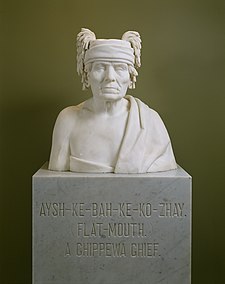Aysh-ke-bah-ke-ko-zhay
Aysh-ke-bah-ke-ko-zhay | |
|---|---|
 Marble bust of Aysh-ke-bah-ke-ko-zhay in the US Senate by Francis Vincenti | |
| Ojibwa leader | |
| Personal details | |
| Children | Niganibines |
| Known for | Negotiated cession of ten million acres, including the headwaters of the Mississippi |
| Nickname(s) | "Flat Mouth" (Gueule Platte) |
Aysh-ke-bah-ke-ko-zhay (or Aish-Ke-Vo-Go-Zhe, from Eshkibagikoonzhe, "[bird] having a leaf-green bill" in Anishinaabe language; also known as "Flat Mouth" (Gueule Platte), a nickname given by French fur traders) was a powerful Ojibwe chief who traveled to Washington, D.C. in 1855, along with Beshekee and other Ojibwa leaders, to negotiate the cession of ten million acres (40,000 km²) including the headwaters of the Mississippi in northern Minnesota.[1]
Quotes[]
"We are endlessly told to bury the war hatchet, and if we dig it up we are threatened with rods and ropes, or with being placed under the ground, we the Missinabes, the Eagles, the Bears [totems], free in our own forests... Thus the Americans plan to treat us as they treat their black people...I am not an animal. I am not like those in the East whom they call their children and whom they treat like three or six-year-olds, rod in their hand. They purchased their lands, and now they hold them prisoner and treat them as slaves."
— Eshkebugecoshe, head chief of the Pillager Band of Chippewa Indians, to French geographer Joseph Nicollet in the 1830s, speaking of his people's feelings that they were losing control of their lives[2]
"Tell him I blame him for the children we have lost, for the sickness we have suffered, and for the hunger we have endured. The fault rests on his shoulders."
—Aysh-ke-bah-ke-ko-zhay, Leech Lake Band of Ojibwe speaking of Territorial Governor Alexander Ramsey[3]
Notes[]
- ^ "Biography of Aysh-ke-bah-ke-ko-zhay." United States Senate. (retrieved 17 May 2011)
- ^ Angel, Michael (2002). Preserving the Sacred: Historical Perspectives on the Ojibwa Midewiwin. University of Manitoba Press. p. 86. ISBN 9780887556579.
- ^ Schenck 96
References[]
- Schenck, Theresa M. William W. Warren: The Life, Letters, and Times of an Ojibwe Leader. Lincoln: University of Nebraska Press, 2007. ISBN 978-0-8032-4327-9.
- Ojibwe people
- Native American leaders
- Native American history of Minnesota
- People of pre-statehood Minnesota
- 19th-century Native Americans
- Native American politician stubs